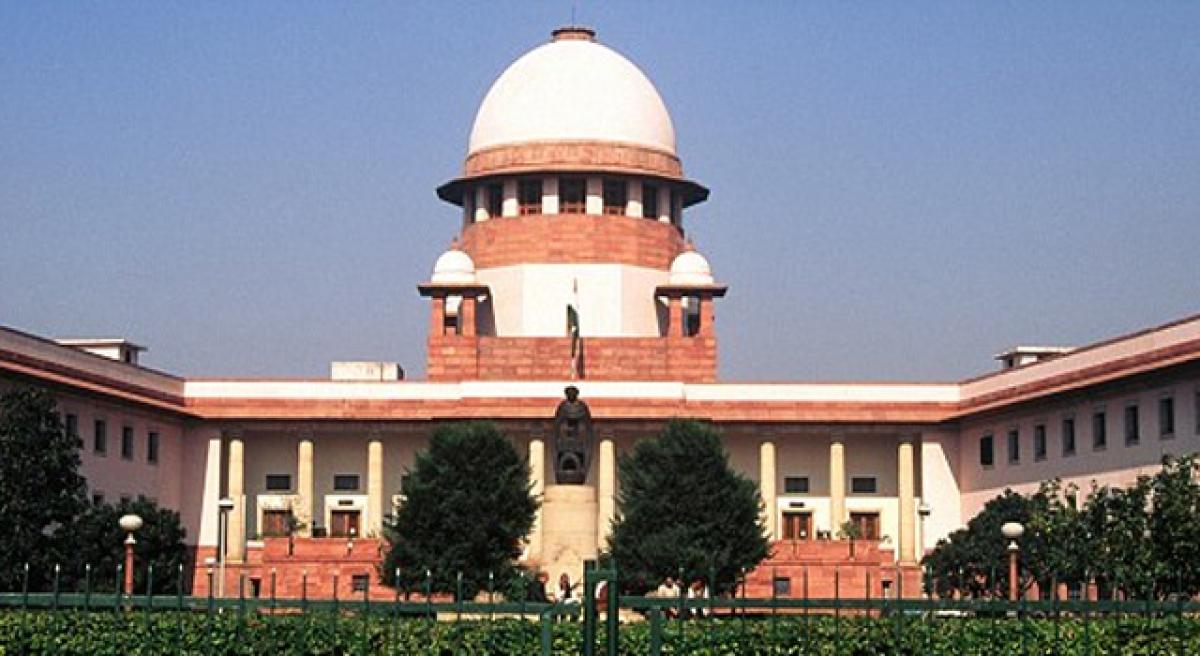Live
- Vizag mafia rules sand ramps in Srikakulam district
- Unselfishness is a Lie
- ICTPL welcomes maiden vessel MV KSL Fuyang
- BJP leaders mock Rahul's speech
- Analysing Happiness
- Two-day ToT organised for trainers
- Savarkar preferred Manusmriti to Constitution: Rahul
- Daily Horoscope for 15 December 2024: Embrace Today’s Insights of Your Zodiac Sign and Unlock Your Potential.
- Beyond The Flames
- CM warns officials of stringent action
Just In

The Supreme Court on Thursday declared the National Tax Tribunal (NTT) which was set up to decide tax- related cases, as unconstitutional, saying it encroaches on the \"exclusive domain\" of the superior courts.
.jpg) New Delhi: The Supreme Court on Thursday declared the National Tax Tribunal (NTT) which was set up to decide tax- related cases, as unconstitutional, saying it encroaches on the "exclusive domain" of the superior courts.
New Delhi: The Supreme Court on Thursday declared the National Tax Tribunal (NTT) which was set up to decide tax- related cases, as unconstitutional, saying it encroaches on the "exclusive domain" of the superior courts.
The apex court said substantial questions of law can be decided only by the High Courts and the Supreme Court which cannot be vested in other body as has been done in case of NTT and declared the Act passed by Parliament in 2005 as unconstitutional.
A five-judge Constitution Bench headed by Chief Justice R M Lodha said tribunalization can be allowed only at the original stage and jurisdiction of the High Courts cannot be taken away and given to NTT.
"If the jurisdiction of the High Courts is being transferred to the NTT, the stature of the Members of the tribunal had to be akin to that of the judges of High Courts.
"So also the conditions of service of its Chairperson/ Members. And the manner of their appointment and removal, including transfers. Including, the tenure of their appointments," Justice J S Khehar, wrote the judgement on behalf of the CJI, himself, justices J Chelameswar and A K Sikri, said.
Justice R F Nariman, who wrote a seperate but concurring judgement, said setting up of NTT is a direct encroachment on the High Courts’ power which cannot be allowed and the Act is a departure made for the first time by Parliament on that front.
Referring to earlier verdicts of the apex court allowing tribunalization at the original stage subject to certain safeguards, Justice Nariman said, "The boundary has finally been crossed in this case. I would, therefore, hold that the National Tax Tribunal's Act is unconstitutional, being the ultimate encroachment on the exclusive domain of the superior Courts of Record in India".
"Jurisdiction to decide substantial questions of law vests under our constitution, only with the High Courts and the Supreme Court, and cannot be vested in any other body as a core constitutional value would be impaired thereby," he said adding, "All substantial questions of law have under our constitutional scheme to be decided by the superior courts and the superior courts alone".
The apex court said that the legislature can transfer judicial power from a traditional court, to an analogous court/tribunal with a different name but the court/tribunal to which such power is transferred, should be possessed of the same salient characteristics, standards and parameters, as the court the power whereof was being transferred.
The first petition on the issue was filed in 2006 when the Madras Bar Association had challenged the setting up of NTT and later many other lawyers bodies followed suit.
The NDA government had justified the creation of NTT, saying that the idea of creating tribunals was to unclog the backlog of cases in the high courts.

© 2024 Hyderabad Media House Limited/The Hans India. All rights reserved. Powered by hocalwire.com







